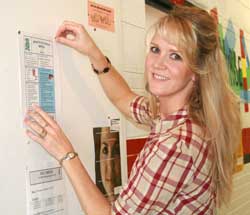 |
Dawn Garcia hangs a poster up to educate school staff and students about methicillin-resistant Staphylococcus aureus – called MRSA. (Photo provided courtesy of Connie Jo Discoe of the McCook Daily Gazette) |
She knew when she heard the news that the outbreak would raises concerns among administration, faculty, students and parents at her school — which facilitates 1,500 students ranging from kindergarteners to 12th grade.
“After hearing about the MRSA outbreak in the school systems in different parts of the country, we wanted to be proactive in infection control practice to protect our students and staff,” Garcia said.
Though the school didn’t have an outbreak, with Garcia’s help, it took preventive measures.
“The philosophy of public health nursing, which emphasizes primary prevention, includes being proactive in addressing public health issues before they become significant problems,” said Garcia, who’s enrolled in the UNMC College of Nursing’s Health Systems Nurse Specialist program. “My nursing program also emphasizes evidence-based interventions, so you go to the research and look at how a problem has been successfully prevented or treated in the past.”
One of the first things Garcia and other members of her staff did was meet with the head of school maintenance to prepare a meeting with custodial staff on cleaning and disinfectant routines.
“I was really impressed,” Garcia said. “The administration, coaches and other staff members really got on board. We put hand sanitizer in computer labs and weight rooms, and distributed MRSA education posters around the school. Our head football coach established regular cleaning and disinfecting routines for helmets and other equipment, and our head boys basketball coach had a fundraiser to purchase individual towels for his players.”
The school also now requires locker rooms to be completely cleaned out once a week so all surfaces can be cleaned.
Garcia provided MRSA education and general infection control guidelines to administrators, staff and students and spoke to the school board about what the district was doing. Information was sent home with students.
One of the main messages was community-acquired MRSA, which can start as infection in open areas on the skin, may be transmitted by touching someone’s infected skin, touching contaminated surfaces and sharing personal hygiene items such as towels, soap and razors.
|
|
She used educational resources from public health departments, the Department of Health and Human Services, and the Centers for Disease Control and Prevention. Garcia also turned to UNMC’s McGoogan Library of Medicine online library links to PubMed and MEDLINE, which provide current scientific literature of MRSA-related health information.
“We aren’t going to eliminate MRSA or other staph infections, our main goal is to reduce the potential transmission of the infection,” she said. “Instituting these infection control measures during the flu season was a perfect time. We can protect against other microorganisms in the school system. We don’t want to go overboard, just take a few additional measures and enhance our current cleaning and disinfecting routines.”
Word of what Garcia was doing reached the media and she first was interviewed by the McCook Gazette and then by two radio stations and a television station.
“We have two public health departments in the McCook area,” Garcia said. “They helped get me info and helped get the word out.”
Garcia, who graduates in May, credits her past experience as a hospital charge nurse, and a UNMC research nurse, as well as classes in public/community health nursing, for helping her address this public health concern and calm fears.
“I have received some real positive feedback from the community and had quite a few phone calls from parents requesting I look at certain wounds on their student,” Garcia said. “Probably the most beneficial thing is raising community awareness about MRSA and emphasizing the best ways to prevent it, such as good hand washing practices.”